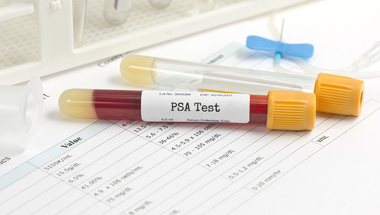Treatments
20 Jan 2023We now recommend all Black men over 45 speak to their GP about a PSA blood test.
Watch our webinar to help us tackle inequality and spread this vital message.

As you may know, 1 in 4 Black men are diagnosed with prostate cancer - that’s double the risk of the rest of the population. 1 in 12 Black men die from prostate cancer, compared to 1 in 24 white men and 1 in 44 Asian men. That’s why we're funding research to find out why black men are at higher risk.
But we have a lot of work to do elsewhere too. We know that Black communities face barriers when accessing health services, and rates of men being tested don’t reflect their increased level of risk. We need to create stronger messaging to encourage Black men to get tested, and we need to understand the cultural barriers preventing them from accessing PSA blood tests.
Why have we changed our guidance?
We recently reviewed our advice on the PSA blood test for all men, following a review of new evidence and workshops including men with lived experience, academics, and clinicians. We’ve taken an interim position on our guidance, because a large-scale study of PSA blood test use in the UK and an evidence review are currently underway. Our advice to men will continue to evolve in response to its findings.
Following our principle of focusing on those at highest risk first, we’ve been working with Black men with prostate cancer, Black communities and organisations from the NHS, academia, the charity sector and policy makers - to fully understand views across the community. In our workshops we discussed:
- How to encourage Black men to engage in research trials
- Cultural aspects that influence why Black men do or do not engage with our health messaging.
- Building trust and working with community organisations to reach Black men.
- Supporting schools, colleges and universities to raise awareness of prostate health and normalise discussions about men’s health.
- Supporting community organisations to access our health information resources and online training.
Thanks to the many participants who shared their knowledge and personal experiences of prostate cancer, this work has resulted in a change to our guidance for Black men, and the following statements were agreed unanimously by all workshop participants:
Priority Message: Because Black men have double the risk of prostate cancer and develop it younger, we strongly recommend they talk to their GP about a regular PSA blood test from the age of 45. As a Black man, if you are worried about prostate cancer, you can speak to a GP from any age.
And a secondary message:
Secondary message: Black men with a known family history of prostate or breast or ovarian cancer have the highest risk and should seriously consider PSA blood testing at an earlier age.
Read more about our revised guidance on PSA blood tests here.
Tottenham-based Nurse, Karen Bonner lost her dad, Egbert, in 2014, four years after he was diagnosed with metastatic prostate cancer. Since then Karen has worked tirelessly for others in her dad's memory, raising awareness of prostate cancer, especially in the Black community. She said:
"“My Dad Egbert died of advanced prostate cancer, and as a nurse and a black woman, I have a real understanding of the unique challenges the Black communities face. I feel really positive about the work we’ve done so far improving our messages and am looking forward to hearing ideas and suggestions from other supporters - so we can save more lives.”



